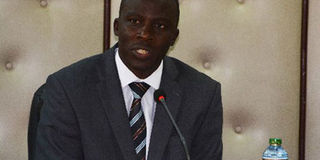Tunoi tribunal postponed after lawyer protests over document about judge

Judiciary Ombudsman Kennedy Bidali, the latest witness to face a tribunal investigating Justice Philip Tunoi at Anniversary Towers in Nairobi on June 2, 2016. PHOTO | ANTHONY OMUYA | NATION MEDIA GROUP
What you need to know:
- Judge Philip Tunoi's lawyer Fred Ngatia demands that tribunal shed light on report used to indict the judge.
A tribunal investigating a Supreme Court judge was on Thursday adjourned to Tuesday following protests from a lawyer over the authenticity of a National Intelligence Service report that was relied on to indict the official.
Mr Fred Ngatia, representing Justice Philip Tunoi, declined to cross examine the Judiciary Service Commission Ombudsman Kennedy Bidali until the tribunal asks the National Intelligence Service to confirm if it authored the report, which was used to suspend the judge.
Mr Bidali is the one who gave the report to the commission, saying he had received it from an unnamed intelligence officer.
Mr Ngatia argued that the Judiciary “heavily relied” on the report in its decision to recommend a tribunal to investigate Judge Tunoi following allegations that he received a Sh200 million bribe from Nairobi Governor Evans Kidero to rule an election petition in his favour.
He argued that he would not cross examine Mr Bidali “in the blind” and that he would not proceed until the intelligence service shed light on the report’s origin.
“This report features the collaborative part and without it, it’s only allegations flying from one person to the other,” he said.
Mr Ngatia was to cross examine Mr Bidali yesterday, but disagreed with tribunal chairman Sharad Rao, who had said his team would not rely on the alleged intelligence report to make its decision.
“That report draws certain conclusions and, therefore, we decided that we will not be looking at or relying on the contents,” said Mr Rao.
He also said the spy agency had given them a response on the report, but had labelled it classified information.
But Mr Ngatia protested and asked that the tribunal adjourn for 15 minutes to allow the lead counsel, Mr Paul Nyamodi, to contact the intelligence service or he would seek a court order to have them summoned to the tribunal.
After the break, Mr Nyamodi reported that he had received a letter from the intelligence service about the report, but that it was classified.
He said the tribunal wrote to the director-general on April 19, asking him to confirm whether the document had originated from them or not but their response was classified.





